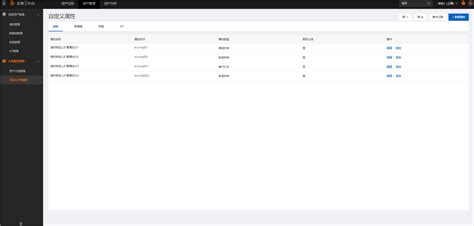自定义产品属性怎么填淘宝
```html
Optimizing Ecommerce Strategies with Custom Attributes
Ecommerce businesses thrive on understanding their customers and tailoring experiences to meet their needs. Custom attributes play a crucial role in achieving this by allowing businesses to gather specific data points about their customers and products. Let's explore how custom attributes can be leveraged to optimize ecommerce strategies:
Custom attributes enable ecommerce platforms to collect detailed information about customer preferences, behaviors, and demographics. Utilizing this data, businesses can create personalized product recommendations that resonate with individual customers. For example, if a customer frequently purchases organic products, the platform can recommend similar items or highlight ongoing promotions related to organic goods.
Segmenting customers based on custom attributes allows for highly targeted marketing campaigns. By understanding the specific needs and interests of different customer groups, businesses can craft compelling messages and promotions. For instance, if a segment of customers is interested in ecofriendly products, the marketing team can create campaigns highlighting the sustainability aspects of certain products.
Custom attributes empower ecommerce platforms to deliver a more tailored and seamless shopping experience. By capturing data such as preferred payment methods, shipping addresses, or communication preferences, businesses can streamline the checkout process and provide personalized customer support. This leads to higher customer satisfaction and loyalty.
Custom attributes are not limited to customer data; they can also be applied to product information. By tagging products with attributes such as seasonality, popularity, or compatibility, businesses can optimize inventory management and forecast demand more accurately. For example, knowing which products are popular during certain seasons allows businesses to adjust their procurement and marketing strategies accordingly.

Custom attributes provide insights into customer purchasing behavior and price sensitivity. This data can be leveraged to implement dynamic pricing strategies, where prices are adjusted based on factors such as demand, competition, and customer segments. For instance, offering discounts to pricesensitive segments or adjusting prices dynamically during peak shopping hours can maximize revenue.
Custom attributes can also aid in identifying and preventing fraudulent activities. By analyzing patterns in customer behavior and transaction data, businesses can create risk profiles and flag suspicious activities in realtime. For example, unusual purchasing patterns or discrepancies in shipping addresses can trigger additional verification steps to mitigate fraud risks.
Lastly, custom attributes facilitate datadriven decisionmaking and continuous improvement. By tracking key performance indicators (KPIs) associated with custom attributes, businesses can gain insights into the effectiveness of their strategies and identify areas for optimization. Regularly analyzing customer data and feedback allows ecommerce platforms to evolve and stay ahead of changing market trends.
Custom attributes are invaluable assets for ecommerce businesses seeking to enhance customer engagement, streamline operations, and drive revenue growth. By leveraging data effectively and implementing tailored strategies, businesses can create personalized experiences that resonate with their target audience. Embracing custom attributes as part of the ecommerce toolkit is essential for staying competitive in today's dynamic market landscape.
